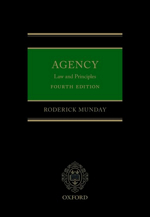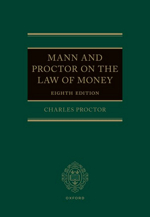
Agency: Law and Principles by Roderick Munday
Publisher: Oxford University Press
Edition: 4th Edition (February 2022)
ISBN: 978-0-19285619-7
Price: £135.00
Buy from Oxford University Press
For any commercial practitioner, the concept of agency is never far away. For example, many businesses operate using commercial agents (which is highly regulated) or have third parties selling goods for them. There may also be ad hoc agency arrangements, or more formalised agency relationships. There can also be ‘agency’ relationships (in a broader sense) which impose particular duties (for example, a fiduciary duty or some other duty of disclosure or information). Agency: Law and Principles brings together all of those concepts into a practical and accessible account of the law.
Agency: Law and Principles is split into thirteen chapters: the nature of agency; creation of agency; the actual authority of the agent; apparent authority; authority deriving from agency of necessity; ratification; the agent’s liability for breach of warranty of authority; legal relations between principal and agent: duties the agent owes to his principal; legal relations between principal and agent: rights of the agent against the principal; legal relations between principal and agent; the tortious liabilities of principal and agent; legal relations between agent and third party; and termination of agency. Each chapter is sub-divided into a series of short and clear paragraphs.
I have been a fan of Agency: Law and Principles for a number of years. This new edition has impressively and seamlessly incorporated of a significant amount of new material. For example, it considers the implications of the European Withdrawal Act 2018 on the English Court’s interpretation of the Commercial Agents (Council Directive) Regulations 1993. It also considers the important distinction between agents, employees and independent contractors: a topic which led to the UK Supreme Court’s decisions in Various Claimants v Catholic Child Welfare Society [2012] 3 WLR 1319 and, more recently, the decisions in WM Morrison Supermarkets plc v Various Claimants [2020] AC 989 and Barclays Bank plc v Various Claimants [2020] AC 989.
For anyone dealing with the knotty topic of agency law, Roderick Munday’s Agency: Law and Principles provides a clean and accessible account of the law. It covers a wide range of topics including commercial agents under the Commercial Agents (Council Directive) Regulations 1993, statutory agents under the Factors Act 1889 and more general agency relationships. Its layout is also clear and accessible; allowing the reader to quickly find the relevant passages. The footnotes also provide a great starting point for further research on more nuanced issues.
Reviewed on 15 July 2024

